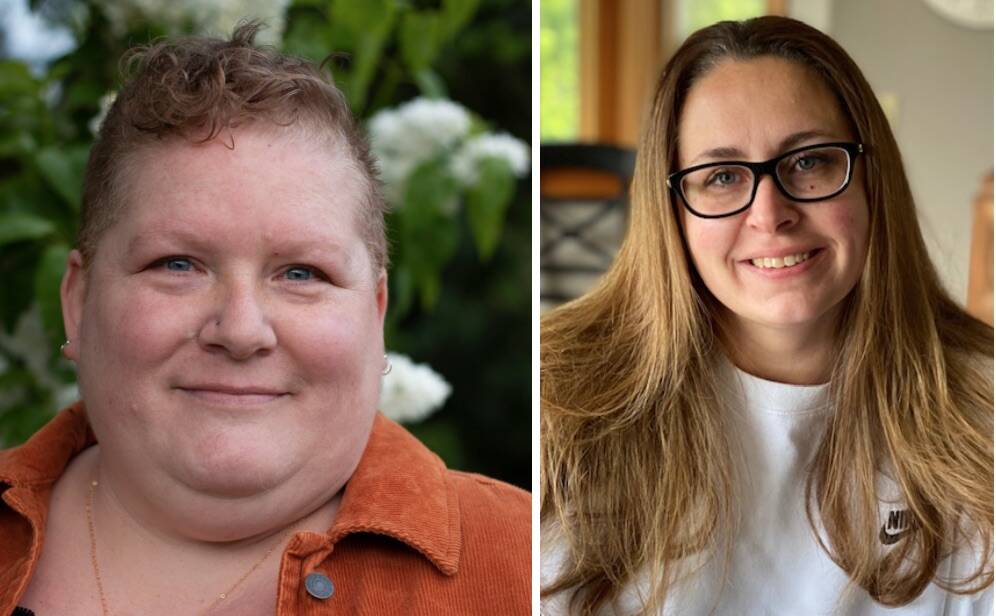A South Whidbey community member and school volunteer is seeking to win a school board seat from an established incumbent who was once an educator.
Board member Ann Johnson and challenger Bree Kramer-Nelson share a love for students and support for the COVID-19 mitigation measures keeping them safe and in school but differ in their priorities for the district.
Johnson was appointed to the school board just over a year ago, following another board member’s retirement. She occupies Position 5. She said that she has served on many boards as part of her work in the nonprofit sector, but school board membership in particular comes with a steep learning curve. She has spent much of last year training and learning about the work the board does.
Her experience extends far back before her year on the school board. In her 25 years of experience in education, she has worked with students in many capacities, including as a classroom teacher, as an instructor in other settings and by helping students experiencing homeless access basic needs and tutoring support.
The incumbent said one value she adds to the board is her student-centered approach to the work. Centering the students impacts her approaches to academics, curriculum and equity at school.
According to the Washington State Report Card for the district, 62.7% of South Whidbey students are meeting state standards in English Language Arts, 45.5% are meeting state standards in math, and 58.2% are meeting state standards in science. Johnson said rigorous academics ought to be a top concern for all board members, while also acknowledging that test scores are “quantitative only.”
“They don’t show you what goes on in the classroom every day,” she said. “They don’t show you the work that teachers put in every day on behalf of their kids. They don’t show you how hard those kids themselves work every day in the classroom, and they certainly don’t show what kids are experiencing outside the classroom.”
Though schools are limited in their ability to affect what happens in students’ personal lives, Johnson said the school can help level the playing field for students facing adverse circumstances by continuing in the work of inclusion and anti-racism, promoting social and emotional health and supporting students struggling with homelessness, hunger or other basic needs loss.
“We need to look at (test scores) holistically and see what else we can do within our systems, with our policies, to make sure those kids are cared for first so that they can receive and activate in a rigorous education,” she said.
Kramer-Nelson also expressed concern over academic achievement in the district, specifically noting the district’s math score as an indication that the subject requires more attention, but did not specify a policy plan.
The challenger has been a member of the South Whidbey High School athletic booster club since 2016 and is in her third year serving as club president. The club has raised more than $30,000 in scholarships for graduating seniors in the past three years. Prior to joining the booster club, she served as the treasurer of the youth sports football league for about six years.
She cited the maintenance and appearance of the school buildings as one of her top concerns for the district. This summer, she and fellow candidate Farrah Manning Davis took a series of photos on the middle and high school grounds, showing areas of the buildings that were dirty or had fallen into disrepair.
“The condition of our school buildings, facilities and grounds need to be addressed,” she said in an email to The Record.
Jeremy Leuenberger, maintenance director and capital projects manager for South Whidbey schools, has previously told The Record that the school has been working on securing funds to address maintenance needs, such as recladding the school’s exterior, since before the pandemic.
Kramer-Nelson has also indicated her support for the new ethnic studies and environmental science classes recently added to the high school curriculum during Johnson’s tenure on the school board.
“I feel that it is very important for today’s youth to learn about our nation’s history, including climate science and ethnic studies. These are all important factors that our youth will have to face in adulthood,” she said. “I also feel there is more that we can do or offer for life after high school for those students that may not be going on to college.”
The Record has previously reported that South Whidbey High School offers an extensive career and technical education curriculum.
Kramer-Nelson shares her opponent’s focus on students.
“This last year has shown me how much these students need to be heard, and supported regardless of their individual backgrounds,” Kramer-Nelson posted on her election Facebook page on May 28.
In late August and early September, she and Manning Davis collected school supply donations for the school district.
Kramer-Nelson and Johnson also share a support for the COVID safety policies currently in place at the school. The South Whidbey school district follows state mandates that require masks to be worn in schools and other indoor public spaces and public school employees to be vaccinated.
“I do support the safety measures because it allows my child to be back in school in person full time,” Kramer-Nelson wrote in an email. “In his case this was needed as ‘Zoom’ school was not working for my child.”
Johnson also said she supports the safety mandates and acknowledged that the mandates came from the state, not from the school board.
“I think our school district has done a fantastic job of really minding the science,” she said, adding that the district has also made an effort to “keep academics at the forefront, while also really being tuned into the social and emotional health issues that have come from isolation and loss of what kids thought is normal.”
Election day is on Nov. 2.


